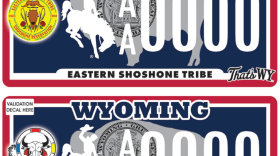-
The agency is selling the remaining inventory on a first-come, first-serve basis. The majority of the sales go to support scholarships for Indigenous students.
-
The Joint Appropriations Committee voted to cut the federal funding from the state’s Department of Health budget earlier this month, but the move was met with pushback and protest.
-
At a workshop at the Wind River Tribal Conservation Summit, attendees rolled up their sleeves and tried their hand at crafting chokecherry patties on Indigenous Peoples Day.
-
Abrahamson Relay from the Colville Tribes in Washington won first in the men’s championship, and Brew Crew from the Oglala Lakota Nation in South Dakota took home the top prize in the women’s category.
-
The Wind River Promise Fund sets aside $250,000 to cover undergrad tuition costs and mandatory fees for full-time students. Another $2 million will be managed and invested like an endowment.
-
Energize Wind River now has access to a roughly $2 million construction grant that was put on hold by the Trump administration earlier this year.
-
The office specializes in tribal collaboration and supports conservation on the Wind River Reservation.
-
Tribal members, law enforcement and state employees talked trainings and a death investigation review with lawmakers.
-
Tribes around the country receive federal support through the annual Indian Housing Block Grant program, but Trump’s proposed budget would decrease the program’s funding by about 20% next year.
-
A commitment structure would create a four-year renewable scholarship that would work with other awards to equal tuition and mandatory fees. But figuring out how to cover the costs is still a work in progress.
© 2026 Wyoming Public Media
800-729-5897 | 307-766-4240
Wyoming Public Media is a service of the University of Wyoming
800-729-5897 | 307-766-4240
Wyoming Public Media is a service of the University of Wyoming

Play Live Radio
Next Up:
0:00
0:00
Available On Air Stations












